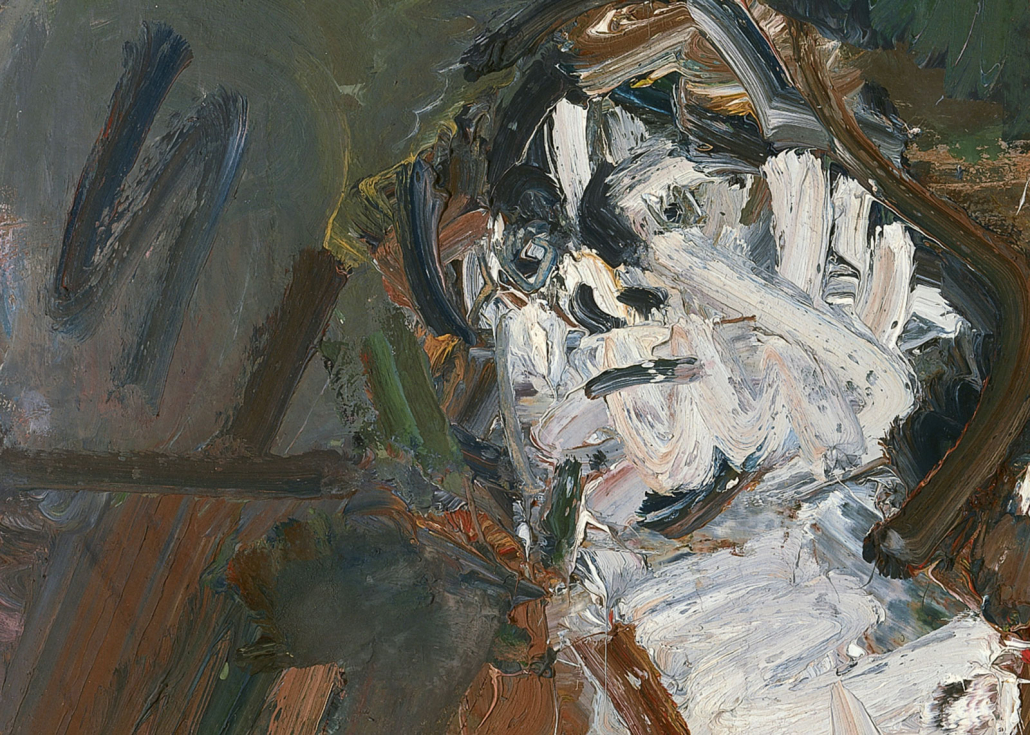Image: Frank Auerbach, ‘Head of J.Y.M.’, 1984-5 (detail).
‘Come away with me’
Andrew Collis
The wedding of Intan Permatasari and Nigel Janson
Genesis 1:26 – 2:3; Psalm 19; Colossians 3:12-14; Matthew 5:1-12
Intan and Nigel, thank you for your trust – and thank you for bringing us together (it’s a special day for you, of course, but also a special day for us, your friends and family). The promises you make today mean something to us – they inspire us (to sing, to rake and tidy the garden …), they renew our trust in faithfulness – and that’s no small thing.
Our readings today are apposite.
Genesis 1 is vivid … for Intan, a vision of the heavenly kindom on Earth. Ever a prompt to conversion, and reminder of joyful camping adventures with Nigel … “In fields where the yellow grass grows knee-high” (Norah Jones).
In like manner our opening prayer, Psalm 19, holds a love for Creation with a love for Torah – it celebrates the world of God in the Word of God, or the Word of God in the world of God.
The psalmist is vulnerable, we note, when singing of personal faults, confessing dependence on mercy: “Forgive the misdeeds I don’t even know about!” I cannot heal, cannot save myself. Healing, salvation is the work of another …
We can think of forgiving as fore-giving – giving first. We love because we are already loved – because our God fore-gives, gives first.
In the words of the apostle: “Because you are God’s chosen ones, holy and beloved, clothe yourselves with heartfelt compassion, with kindness, humility, gentleness and patience. Bear with one another; forgive whatever grievances you have against one another – forgive in the same way God has forgiven you.”
The more I know another person, the closer the friendship, the more there is to forgive. Friendship is a vulnerable thing – and, of course, marriage too.
Intan, the more you come to know Nigel, the more there will be to forgive. Nigel, the more you come to know Intan, the more there will be to forgive.
Not the most romantic sentiment, perhaps, yet full of grace and truth. “Blessed are those who show mercy to others: they will be shown mercy … Blessed are those who work for peace: they will be called children of God …”
A documentary about the painter Frank Auerbach is instructive.
The artist’s family was murdered by the Third Reich, and Frank alone escaped to England. By any standard a committed artist, Auerbach works 364 days a year in his home studio. The world comes to Auerbach by way of sitters from all walks of life who pose for portraits – every day of the week sees a different sitter in the studio – and the artist spends months, sometimes years, on a single portrait.
Sitters (who play an active role in the creative process) say that Auerbach is passionate, sometimes furiously so, in pursuit of the work. We might ask, “What is he looking at? What is he looking for?” Applying paint thickly, quickly, moving it around, scraping it back, rubbing it all away and starting again, and again.
The pictures do not express a desire to find fault or to expose flaws. There is no sense of doing violence or taking advantage of so many hours at the easel. Auerbach wants an image that “surprises” him.
It should be “like” the sitter, he says – it should be faithful. Art is discovery, however – “art is adding something to the world”. The artist – God bless him – wants to give first.
Perhaps that’s a more romantic point. Nigel and Intan, you are, each to the other, both artist and sitter. Bear with each other. Be thankful. Revere the vulnerability you are led to show and share.
Grasp not the love you have received as a gift, but whatever you do, whether in word or action, anticipate the one to be revealed – the spouse who surprises, the human being who adds something to the world; the child of God you, too, will be called.
“Come away with me / And I’ll never stop loving you …” Amen.




